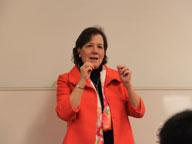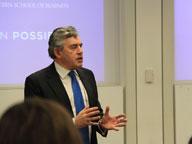Business and Policy Leader Events
—
Distinguished Citi Fellow Mindy Lubber of Ceres Challenges Students to Change the World
—

Distinguished Citi Fellow in Leadership & Ethics Mindy S. Lubber, president and founding board member of Ceres, a nonprofit organization that advocates for sustainable business and investment practices, spoke candidly with MBA and undergraduate students this fall.
Business and Policy Leader Events
—

Distinguished Citi Fellow in Leadership & Ethics Mindy S. Lubber, president and founding board member of Ceres, a nonprofit organization that advocates for sustainable business and investment practices, spoke candidly with MBA and undergraduate students this fall.

















